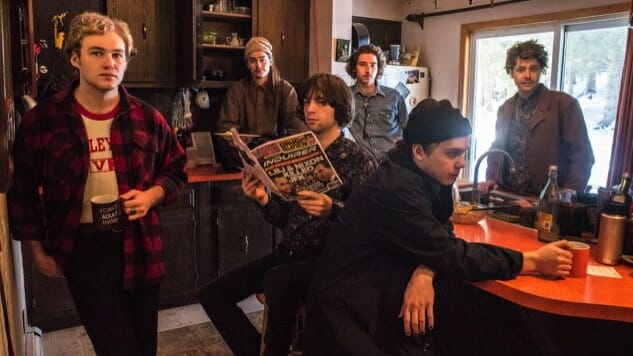The Curmudgeon: The Sons of Lou Are Playing a Velvet Guitar
Nude Party photo by Sacha Lecca, courtesy of New West Records
In the 1960s, when groundbreaking songwriters such as Bob Dylan, John Lennon and Paul Simon were all working within the romantic tradition, Lou Reed stood out as a defiant anti-romantic. While the others were suggesting that the world was full of wonderful, stimulating sensations that a conformist society had overlooked, Reed was suggesting that the same world was filled with depraved behavior that the same society had hidden. When Reed sang songs about drug addiction, S&M sex and domestic violence with the Velvet Underground, he was pointing to the abyss and daring us to look in.
Reed’s contrarian attitude wouldn’t have mattered much if he hadn’t had such extraordinary verbal skills to convey it. When he sings in “Heroin,” “I’m goin’ to try to nullify my life, ’cause when the blood begins to flow, when it shoots up the dropper’s neck, when I’m closing in on death, you can’t help me, not you guys,” he’s giving us a visual, tactile and psychological description too vivid to ignore.
The fact that all four of the above songwriters were telling the truth doesn’t lessen Reed’s importance as a much needed corrective to the decade’s rose-tinted optimism. His commercial impact was greatly limited by his subject matter, for it seems that the general public would much rather hear songs about a Tambourine Man and Strawberry Fields than songs about heroin. Those who did listen to Reed, however, often started their own bands.
But Reed’s brilliance as a lyricist often overshadows his other crucial contribution: one of the most original rhythm-guitar sounds in rock ’n’ roll history. It was a stridently non-blues, non-pop guitar style to match the anti-romantic lyrics. When played slow, it alternated single-note chiming with brusque chording and lots of vibrato. When played fast, it was a clipped, brittle riff, edged with distortion. It was as if the instrument was steeling itself for something unpleasant.
Reed played changes as if he were reluctant to let the harmony resolve; he was more likely to go to the minor sixth than to ever return to the one. It was as if the lack of resolution reflected a life without lasting satisfaction, as if the lack of resolution would keep the listener—and himself—in suspense about what might happen next.
It was a hypnotic sound that many admiring musicians adopted as their own. David Bowie’s early, guitar-oriented singles had that sound, and Bowie repaid the favor by producing the only top-100 single of Reed’s career, “Walk on the Wild Side.” Alejandro Escovedo embraced Reed’s six-string style so thoroughly that he wrote a song called “Velvet Guitar.” The Modern Lovers, the Feelies, Sonic Youth, Joy Division, the Jesus and Mary Chain, Patti Smith, Iggy Pop, Television and many more borrowed that brittle, mesmerizing guitar riff.
Even this year, 50 years after The Velvet Underground, the band’s third album, introduced “Candy Says” and “Pale Blue Eyes,” Reed’s guitar sound is fueling the rise of two terrific new rock ’n’ roll bands: Fontaines D.C., an Irish quintet currently touring the U.S. in support of its 2019 debut album, Dogrel, and the Nude Party, an American sextet now on the road to showcase its eponymous 2018 debut album.
Fontaines D.C. met at a music college, where they impressed each other during a songwriting class. They named their new band after Johnny Fontaine, the wedding singer who asks Don Corleone for a favor at the beginning of the first Godfather movie and after the initials for their town, Dublin City. Dogrel, however, is wedding music only for the never consummated marriage of Sid Vicious and Nancy Spungen—or perhaps of William Butler Yeats and IRA radical Maud Gonne.
Even before one can focus on the lyrics, Fontaines D.C.’s debt to Reed is obvious. The vigorous riffing of the opening track “Big” has that familiar brittle, reluctant-to-resolve approach to the guitar, pushing the music along impatiently. When you do catch the words, it’s obvious that the steely chording serves am examination of a city’s seamy side similar to Reed’s. “Dublin in the rain is mine,” Grian Chatten half-sings, half-snarls, “a pregnant city with a Catholic mind. Starch those streets for the birdhouse jail, all mescalined when the past is stale.”

Fontaines D.C. photo courtesy of Partisan Records
The lyrics are sometimes too “literary” for their own good, lacking the deadpan, in-the-trenches observations of Reed’s monologues—or the stoic detachment of Yeats’ poetry. Small verbal gems are scattered across the record, though, promising that maybe the band’s lyrics will grow into its music. Chatten describes the rear-end hours of Saturday night thusly, “A cabbie pisses in the wheel of his own car; heads hit the street, turn cheeks at stars.” He etches the weekday evening commute like this: “The city in its final dress. And now a gusty shower wraps the grimy scraps of withered leaves around your feet.” In lines like these, he captures the price one pays for living in a “happening” city.
-

-

-

-

-

-

-

-

-

-

-

-

-

-

-

-

-

-

-

-

-

-

-

-

-

-

-

-

-

-

-

-

-

-

-

-

-

-

-

-








































